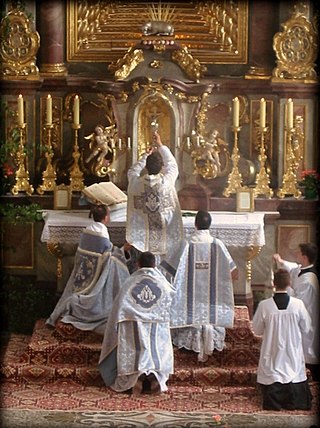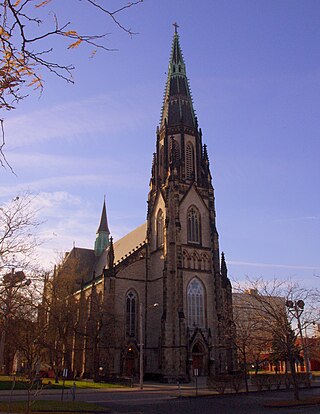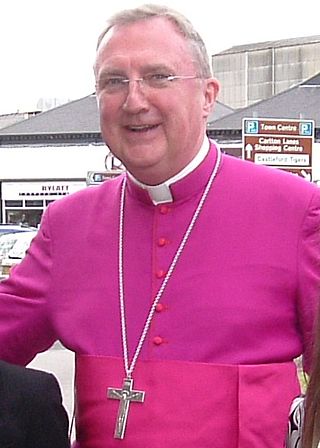
The Latin Mass: A Journal of Catholic Culture, commonly referred to as Latin Mass Magazine, is an American Catholic magazine published quarterly, with a traditionalist Catholic viewpoint.[ citation needed ] It is based in Ramsey, New Jersey. [1]

The Latin Mass: A Journal of Catholic Culture, commonly referred to as Latin Mass Magazine, is an American Catholic magazine published quarterly, with a traditionalist Catholic viewpoint.[ citation needed ] It is based in Ramsey, New Jersey. [1]
Latin Mass Magazine was established in 1992. [2] Published by the Catholic organization Keep the Faith, the magazine is a strong supporter of the traditional Tridentine Mass. It has often expressed skepticism about the liturgical and other reforms introduced by the Second Vatican Council and Popes John XXIII and Paul VI. [3] The magazine advocates for traditional gender roles and complementarism. [4] The magazine admires Pope Benedict XVI because of his emphasis on traditional Catholic dogma and apparent desire to widen the use of the Tridentine Mass in the church.[ citation needed ]
The magazine claims to be "one of the fastest growing Catholic periodicals in the country." [5] In a 2006 interview with The Wanderer , a Catholic weekly newspaper, former publisher Roger McCaffrey claimed: "In 10 years, the circulation of Latin Mass Magazine will be higher than that of [Jesuit Magazine] America ." [6]
According to its mission statement, the magazine attempts to combat what it sees as "accelerating secularism" by emphasizing a "return of the Church to tradition and authentic organic development". The magazine also holds conferences to encourage conservative priests and laity in furthering a more traditional approach to Catholic teaching and liturgy, and it hopes to establish a study center "that will assist the articulation of Catholic tradition". [5]
Tom Woods had been managing editor starting in 1996. [7] The magazine's most recent managing editor was John W. Blewett, who died February 8, 2013.[ citation needed ]
The publication has seen occasional controversy, such as its dispute with The Wanderer over Humanae Vitae , Paul VI's encyclical on birth control. [8]

Pope Benedict XVI was the head of the Catholic Church and sovereign of the Vatican City State from 19 April 2005 until his resignation on 28 February 2013. Benedict's election as pope occurred in the 2005 papal conclave that followed the death of Pope John Paul II. Benedict chose to be known as "Pope emeritus" upon his resignation, and he retained this title until his death in 2022.

The Mass of Paul VI, also known as the Ordinary Form or Novus Ordo, is the most commonly used liturgy in the Catholic Church. It was promulgated by Pope Paul VI in 1969 and its liturgical books were published in 1970; those books were then revised in 1975, they were revised again by Pope John Paul II in 2000, and a third revision was published in 2002.

The Tridentine Mass, also known as the Traditional Latin Mass or the Traditional Rite, is the liturgy in the Roman Missal of the Catholic Church codified in 1570 and published thereafter with amendments up to 1962. Celebrated almost exclusively in Ecclesiastical Latin, it was the most widely used Eucharistic liturgy in the world from its issuance in 1570 until the introduction of the Mass of Paul VI.

Traditionalist Catholicism is a movement that emphasizes beliefs, practices, customs, traditions, liturgical forms, devotions and presentations of teaching associated with the Catholic Church before the Second Vatican Council (1962–1965). Traditionalist Catholics particularly emphasize the Tridentine Mass, the Roman Rite liturgy largely replaced in general use by the post-Second Vatican Council Mass of Paul VI.
The Good Friday prayer for the Jews is an annual prayer in some Christian liturgies. It is one of several petitions, known in the Catholic Church as the Solemn Intercessions and in the Episcopal Church as the Solemn Collects, that are made in the Good Friday service for various classes and stations of peoples: for the Church; for the pope; for bishops, priests and deacons; for the faithful; for catechumens; for other Christians; for the Jews; for others who do not believe in Christ; for those who do not believe in God; for those in public office; and for those in special need. These prayers are ancient, predating the eighth century at least, as they are found in the Gelasian Sacramentary.

Ecclesiastical Latin, also called Church Latin or Liturgical Latin, is a form of Latin developed to discuss Christian thought in Late antiquity and used in Christian liturgy, theology, and church administration to the present day, especially in the Catholic Church. It includes words from Vulgar Latin and Classical Latin re-purposed with Christian meaning. It is less stylized and rigid in form than Classical Latin, sharing vocabulary, forms, and syntax, while at the same time incorporating informal elements which had always been with the language but which were excluded by the literary authors of Classical Latin.

The Diocese of Charlotte is a Latin Church ecclesiastical territory, or diocese, of the Catholic Church in western North Carolina in the United States. It is a suffragan diocese of the metropolitan Archdiocese of Atlanta.
A Dialogue Mass is a Low Mass wherein the people recite some parts of the Latin Tridentine Mass.

The Roman Rite is the most common ritual family for performing the ecclesiastical services of the Latin Church, the largest of the sui iuris particular churches that comprise the Catholic Church. The Roman Rite governs rites such as the Roman Mass and the Liturgy of the Hours as well as the manner in which sacraments and blessings are performed.
Thomas J. Reese, is an American Catholic Jesuit priest, author, and journalist. He is a senior analyst at Religion News Service, a former columnist at National Catholic Reporter, and a former editor-in-chief of the weekly Catholic magazine America.

Latin liturgical rites, or Western liturgical rites, is a large family of liturgical rites and uses of public worship employed by the Latin Church, the largest particular church sui iuris of the Catholic Church, that originated in Europe where the Latin language once dominated. Its language is now known as Ecclesiastical Latin. The most used rite is the Roman Rite.

The Mass is the central liturgical service of the Eucharist in the Catholic Church, in which bread and wine are consecrated and become the body and blood of Christ. As defined by the Church at the Council of Trent, in the Mass "the same Christ who offered himself once in a bloody manner on the altar of the cross, is present and offered in an unbloody manner". The Church describes the Mass as the "source and summit of the Christian life", and teaches that the Mass is a sacrifice, in which the sacramental bread and wine, through consecration by an ordained priest, become the sacrificial body, blood, soul, and divinity of Christ as the sacrifice on Calvary made truly present once again on the altar. The Catholic Church permits only baptised members in the state of grace to receive Christ in the Eucharist.
Summorum Pontificum is an apostolic letter of Pope Benedict XVI, issued in July 2007. This letter specifies the circumstances in which priests of the Latin Church could celebrate Mass according to what Benedict XVI called the "Missal promulgated by Blessed John XXIII in 1962" and administer most of the sacraments in the form used before the liturgical reforms that followed the Second Vatican Council.

St. Joseph Shrine, founded in 1855, is a historic German Catholic church located at 1828 Jay Street in the Eastern Market–Lafayette Park neighborhood area just outside downtown Detroit, Michigan, on the city's central east side. The building was listed on the National Register of Historic Places in 1972, and deemed "of national importance" because of its stained glass. Three subsidiary buildings—the rectory, convent, and the Wermers House—were added to the listing in 1992. It is under the jurisdiction of the Archdiocese of Detroit, and presently a shrine dedicated to the celebration of the pre-Vatican II liturgy under the care of the canons of the Institute of Christ the King Sovereign Priest.
The post–Vatican II history of the Catholic Church is the recent history of the Catholic Church since the Second Vatican Council (1962–1965).

Arthur Roche is a British cardinal of the Catholic Church who has served as prefect of the Congregation for Divine Worship since 2021. He previously served as secretary of the congregation from 2012 to 2021.
Most Holy Family Monastery is a sedevacantist organization, based in Fillmore, New York. It is headed by two siblings, Michael and Peter Dimond.
John Todd Zuhlsdorf, also known as Father Z, is an American traditionalist Catholic priest known for his blogging activities. Incardinated in the Diocese of Velletri-Segni, he lived and worked in the Diocese of Madison from 2014 to 2021, broadcasting a daily Tridentine Mass and issuing commentary on individuals and events from a traditionalist Catholic perspective.
Traditionis custodes is an apostolic letter issued motu proprio by Pope Francis, promulgated on 16 July 2021 regarding the continued use of pre-Vatican II rites. It restricts the celebration of the Tridentine Mass of the Roman Rite, sometimes colloquially called the "Latin Mass" or the "Traditional Latin Mass". The apostolic letter was accompanied by an ecclesiastical letter to the Catholic bishops of the world.

In the Catholic Church, preconciliar Latin liturgical rites coexist with postconciliar rites. In the years following the Second Vatican Council, Pope Paul VI initiated significant changes. Some of Paul VI's contemporaries, who considered the changes to be too drastic, obtained from him limited permission for the continued use of the previous Roman Missal. In the years since, the Holy See has granted varying degrees of permission to celebrate the Roman Rite and other Latin rites in the same manner as before the council. The use of preconciliar rites is associated with traditionalist Catholicism.
The problem today is far worse. Since Vatican II, a liberalism utterly alien to traditional Catholic thought has insinuated its way into every aspect of Catholic life, even among many people who consider themselves orthodox and exemplary. Disciplinary scandals abound now as then, but in addition to these problems our adversaries have attempted to remake Catholicism altogether, offering us a substitute that bears more resemblance to liberalism, Modernism, and the Enlightenment than to the traditional faith.
There is an increasing amount of information suggesting that men are being marginalized by the emerging social structure in contemporary Western society. Women, due to their physical ability to bear children and the concomitant endowment and desire to nurture them, have a significant and irreplaceable role through the design of nature. Men, on the other hand, are not as comfortable with themselves. Unlike women, who possess a clarity of role due to their inherent maternal qualities, men do not have a "built in" social niche that is effected through biology.
I had known her and her family for years before we were married because her mother worked for The Latin Mass magazine, of which I had been managing editor since 1996.